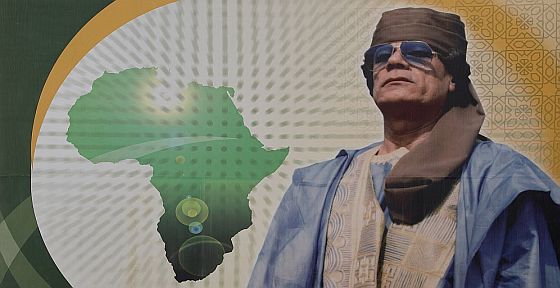The New York Times reports: The leader of Libya’s transitional government declared to thousands of revelers in a crowded square here on Sunday that Libya’s revolution had ended, setting the country on the path to elections, and he vowed that the new government would be based on Islamic tenets.
The sea of flag-waving citizens reacted with shouts of “God is great;” minutes earlier, they had sung the bouncy Italianate national anthem used before Col. Muammar el-Qaddafi came to power. The song has been revived to help celebrate the downfall of the dictator, who was killed on Thursday.
Two strands — a new piety and all-purpose, free-wheeling euphoria — dominated the hastily improvised ceremony, which was intended to put a cap on Libya’s bloody upheaval and mark the beginning of the country’s transition to something approaching normalcy. Laws, institutions, civic life — all must be built from scratch after four decades of Colonel Qaddafi’s personality-cult dictatorship. It is a challenge whose immensity many in the crowd acknowledged, even as they expressed relief that it could finally be undertaken.
The transitional government’s leader, Mustafa Abdel-Jalil, stooping humbly to shake hands in the crowd and embracing the elderly relative of a fallen rebel, made clear that personality would have nothing to do with the new order here.
“We are an Islamic country,” Mr. Abdel-Jalil, the chairman of the Transitional National Council, said as the sun descended. “We take the Islamic religion as the core of our new government. The constitution will be based on our Islamic religion.” He also promised that Islamic banks would be established in the new Libya.
The emphasis on Islam in the short speech — he began by thanking God and declaring God “the greatest — appeared to be an answer of sorts to the speculation about how much of a role religion might play here.
And though Mr. Abdel-Jalil’s religion-edged speech was met with enthusiasm, the crowd’s focus was on freedom, and the pride over how the country had acquired it. Several people suggested that Libya had been virtually imprisoned for 42 years, the length of Colonel Qaddafi’s reign.
“It’s a new life. My feelings are just overwhelming now,” said a man holding the Libyan flag — the pre-Qaddafi banner has also been revived — and standing with his 8-year-old son, who was doing the same. “I never pictured this happening,” said the man, Yousef Amar, an electrical engineer. “This is the beginning, like when the flower grows from nothing.”
Two middle-aged women, beaming, expressed astonishment as they stood together in what is now known as Victory Square. “This is the greatest day of our lives,” said one of them, Mneeba Gargoum. “I’ve never felt this way before for our country,” she said. Her friend, Hawa el-Hawaz, chimed in: “We didn’t have hope before this day. Without Qaddafi, Libya is free. We feel like we are in real country now.”
Mr. Abdel-Jalil, sober and precise, waited patiently as the crowd interrupted him to chant, “Hold your head up high, you’re a free Libyan.” He urged a new respect for the law, and in a nod to the complications of a country that has known years of living under a dictator — he himself was a justice minister under Colonel Qaddafi — exhorted his countrymen to pursue “forgiveness, patience and the truth.”
Jason Pack writes: Amid many questions about the future of post-Gaddafi Libya, one fact cannot be ignored: the Libyan revolution of 2011 is dissimilar – in scope, content, and origin – to its sister revolutions in Tunisia and Egypt. Indeed, it has almost no parallels in world history.
Generally, sweeping revolutionary change (France in 1789, Russia in 1917, etc) is carried out by an organised group at the centre of power with a distinct ideology. In Libya, the revolution originated in the periphery and is surprisingly devoid of ideology.
As with the French and the Russian revolutions, this year’s events in Libya have caused extensive social, political, and structural inversions. By comparison, regime change in Tunisia and Egypt is akin to the “regime change” that democratic countries experience every few years when one leadership group is thrown out and replaced by a new one – generally from within the elites. In this process, the middle-level bureaucrats in the civil service, army, foreign service and local politicians are largely unaffected.
Optimists will note that in Egypt and Tunisia constitutional change is also expected – meaning a rebalancing of the roles of president, army, legislature, bureaucracy, and people. Realists will note that although the future constitutions of these countries are likely to weaken the role of the president and eliminate the use of emergency laws, they are unlikely to fundamentally change the connection between the state, citizens and army or to invert the social classes as the French or Russian revolutions did, or as the Libyan one probably will.
Libya’s revolution was unusual in that it was accomplished by many disparate but highly cohesive local movements that eventually liberated the capital by force. In Libya, a diffuse periphery dominates the centre – and it is hard to think of any other historical revolutionary movement where this was the case.
As a result, there is a danger of “regionalist triumphalism” where “a series of local movements each proclaim their centrality to defeating Gaddafi in an attempt to claim a privileged position in the new Libya,” Lisa Anderson, president of the American University of Cairo, suggested in a phone interview.
What united all of these disparate localities was a distaste for Gaddafi and his centralism. Now Gaddafi is gone. A US diplomat described it to me as follows: “The situation on the ground bears an uncanny resemblance to how the different American states joined together out of their distaste for King George. Once he was gone, stitching the states together was highly problematic. In Libya, the situation of building a nation is even more complex because it is lacking in robust state-level institutions.”

